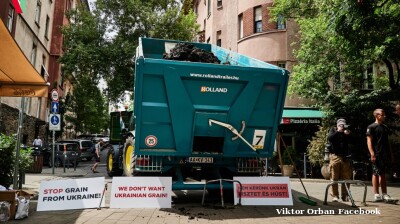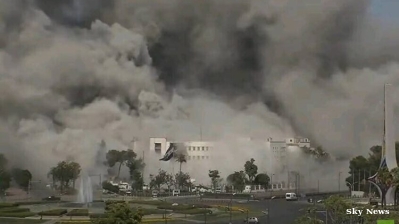Russia is introducing economic counter-measures against Ukraine in retaliation for Kyiv joining a free trade pact with the European Union as of 2016.
Four days after President Vladimir Putin ruled out any sanctions against Ukraine, Prime Minister Dmitry Medvedev said he on December 21 signed measures abolishing Russia's existing free-trade zone agreement with its former Soviet neighbour and launching counter-measures. The measures will include a food import ban, although analysts say that Ukraine's food exports to Russia have already fallen this year to just 1.9% of its overall food exports.
"Starting from January 1, 2016 economic counter-measures will be imposed against Ukraine due to its joining anti-Russia sanctions imposed by the European Union and the US," Medvedev said in comments reported by TASS.
Under the decree, entry charges stipulated by the European Economic Union's common customs tariff will be applied to Ukraine, which means there can be no more trade concessions from Russia for its neighbour, the prime minister said.
"All preferential advantages will be a thing of the past and no benefits will be in place," Medvedev told a meeting with his deputies. He noted that Putin had already signed a decree suspending the free trade zone with Ukraine, which previously allowed duty free import of all Ukrainian goods to Russia apart from sugar.
On December 17, Putin said at his year-end news conference that there would be no sanctions as such against Ukraine, while predicting a "worsening of economic relations" from January 1.
Ukraine will not have benefits or preferences, Putin stressed: "We will have to make a decision we will no longer be doing business with Ukraine as a member of the CIS free trade zone." The free trade zone agreement with Ukraine is terminated, he stressed.
This will mean that while Russia and Ukraine currently use zero rates in trade, from January 1 they will apply the average tariff of 6%. "In some cases it would be 3%, in others 8%, or even 10%," Putin said.
Medvedev underscored that the measures could have been avoided if Ukraine and the EU had not taken an economic course that harms Russia: "We've repeatedly said to Ukraine's authorities that implementation of the economic part of the association with the EU affects our interests and creates risk of economic instability for our country."
Meanwhile, other countries of the Eurasian Economic Union - Kazakhstan, Belarus, Kyrgyzstan, and Armenia - have not yet supported Russia in waiving the free trade area with Ukraine, which operates within the CIS framework, the Ukrinform news agency reported on December 22.
"The monitoring of the consequences of the EU-Ukraine FTA agreement and the elaboration of the legal and technical instruments as well as tools for exchange of information will be carried out within six months," the board chairman of the Eurasian union Viktor Khristenko said after meeting of the presidents of its member countries in Moscow.
At the same time, the president of Belarus, Alexander Lukashenko, said there would be some risks to the free trade area within the CIS starting from January 1, 2016, when the EU-Ukraine free trade agreement enters force.
Chief analyst Zenon Zawada at the Concorde Capital brokerage in Kyiv believes that while the suspended free trade agreement with Russia will negatively impact Ukrainian producers, it will not deal a critical hit to the economy.
"The role of the Russian market for Ukrainian exporters decreased heavily over the last two years," Zawada wrote in a research note on December 22. "In 10M15, the share of Russia in Ukraine's total goods export was 12.8% vs. 19.1% a year ago and 29% in 2011. We anticipated the trend to continue in 2016 with exports to Russia falling below 10% of total Ukrainian commodities exports, with such moves of the Russian government only intensifying the declining trend," he added.
Russia's ban on imports of Ukrainian food won't be excessively painful as total supplies of Ukrainian food to Russia amounted to only $200mn in 10M15 or just 1.9% of Ukraine's overall food exports, according to Concorde.
News
_and_Abdulla_Orusov_(right)_160725_1752697590.jpg)
Trio of Turkmen opposition activists face deportation from Turkey as Ankara “indulges” Ashgabat
Erdogan builds Turkic ties, loses patience with Turkmen critics.

Hungarian farmers dump manure at EU headquarters in protest at planned cuts in CAP funds
Hungarian farmers dumped piles of manure in front of the EU’s headquarters in central Budapest in protest at the European Commission’s plans to overhaul the Common Agricultural Policy from 2028, leading to cuts in agricultural subsidies.

US YouTube star IShowSpeed stuns Lithuania in €30,000 visit, sniffs an official’s armpit
Internet personality Darren Jason Watkins, American – better known as IShowSpeed – arrived in Lithuania on July 15, and was welcomed at the airport by Minister of the Economy Lukas Savickas,

Brazil seeks more time to negotiate as Trump tariffs threaten significant economic damage
Brazil will pursue a rapid reversal of Washington's 50% tariff announcement while remaining open to requesting additional negotiation time, according to Vice President Geraldo Alckmin.




